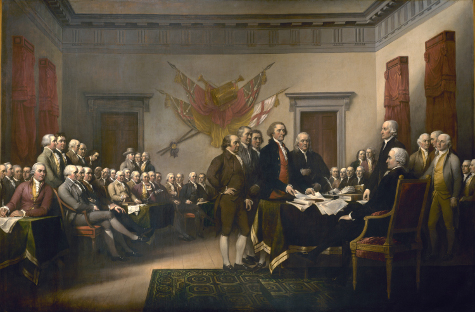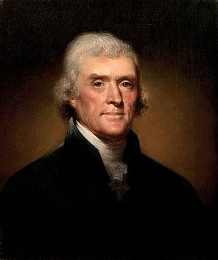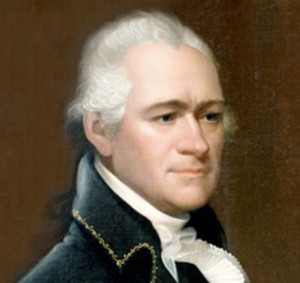Constitution
American exceptionalism: source

It hardly seems exceptional to say, as stated in my book Beyond Detente: Toward an American Foreign Policy, that “the American polity is ultimately based on the principle that all men are created equal.” Nevertheless, and “contrary to universally accepted opinion, this principle, far from being wholly democratic, is the precondition for any genuine aristocracy”! So shocking or paradoxical an assertion requires supportive argument, for which purpose I must refer to my work On the Silence of the Declaration of Independence [the most obvious source of American Exceptionalism].
The Declaration of Independence defines American exceptionalism
Viewed within the proper political context, the statement of the Declaration that all men are created equal was intended to inform mankind in general, and the British government in particular, that Americans belong to the same species as Englishmen, hence that they are endowed by Nature with certain unalienable rights peculiar to that species. These rights constitute an unalienable possession, because man is a created being who did not create himself. More precisely, inasmuch as man did not create his own Nature, he did not create the rights he possesses in virtue of his Nature. In consequence of this he cannot be justly divested of those rights so long as he does not violate his nature or the distinction between man and beasts. In short, only because man is homo rationalis et civilis does he possess (or can he reasonably claim) the unalienable rights to life, liberty, and the pursuit of happiness.
Notice, however, that while the statesmen of the Declaration claimed that the Americans possess these rights as species, they were being prevented from exercising these rights as individuals. This implicit distinction between the possession and exercise of rights is of profound significance. For nothing in the Declaration suggests that all men as individuals are entitled to the actual exercise of their rights without qualification. In proof of this it is sufficient to point out that that preamble of the Declaration or its equivalent was incorporated into most of the state constitutions, many of which prescribed property and other qualifications for voting and for office. An implicit distinction was therefore made between men’s rights and their privileges. Whereas the rights men possess as species are defined by nature, the privileges they exercise as individuals are defined by law, whether written or customary.
Accordingly, the equality spoken of in the Declaration does not extend to privileges. Nevertheless, and strange as it may seem, the notion of privilege is a logical consequence of the Declaration’s principle of equality. For the principle that all men are created equal should be understood as a moral prohibition against any and all privileges based on race, nationality, class, or parentage.
An aristocracy of merit
[ezadsense midpost]
The only moral title to any privilege which society may confer must be based on individual merit. In other words, what the equality of the Declaration requires is that no person be precluded by law of earning any established privilege on the basis of factors extrinsic to human nature or to those intellectual and moral qualities which distinguish the human from the subhuman.
Examined in this light, the principle that all men are created equal – which does not mean they are born equal in their intellectual, moral and physical endowments – may be regarded as the precondition of any aristocracy. As Jefferson wrote to John Adams:
I agree with you that there is a natural aristocracy among men. The grounds of this are virtue and talents…. The natural aristocracy I consider the most precious gift of nature for the instruction, trusts, and government of society.
It thus appears that the American polity had its origin in a synthesis of democratic and aristocratic principles.
This democratic-aristocratic synthesis underlies The Federalist and is most clearly evident in its recurring theme of deference to merit. In Federalist 36, Alexander Hamilton [who was born out of wedlock] declares:
There strong minds in every walk of life that will rise superior to the disadvantages of situation, and will recommend the tribute to their merit, not only from the classes to which they particularly belong, but from society in general. The door ought to be equally open to all.
Therein is the democratic-aristocratic-synthesis of American Exceptionalism.
[ezadsense leadout]
-

 Civilization4 days ago
Civilization4 days agoWhy Europe Shouldn’t Be Upset at Trump’s Venezuelan Actions
-

 Executive5 days ago
Executive5 days agoHow Relaxed COVID-Era Rules Fueled Minnesota’s Biggest Scam
-

 Christianity Today4 days ago
Christianity Today4 days agoSurprising Revival: Gen Z Men & Highly Educated Lead Return to Religion
-

 Civilization5 days ago
Civilization5 days agoThe End of Purple States and Competitive Districts
-

 Executive4 days ago
Executive4 days agoWaste of the Day: Can You Hear Me Now?
-

 Civilization2 days ago
Civilization2 days agoTariffs, the Supreme Court, and the Andrew Jackson Gambit
-

 Civilization2 days ago
Civilization2 days agoWhy Europe’s Institutional Status Quo is Now a Security Risk
-

 Civilization3 days ago
Civilization3 days agoDeporting Censorship: US Targets UK Government Ally Over Free Speech



